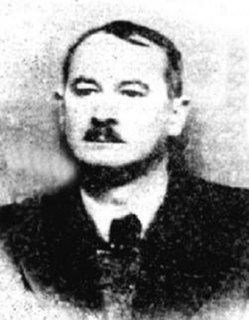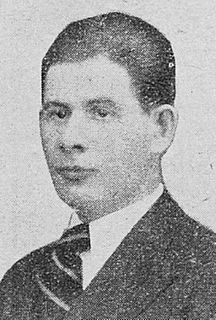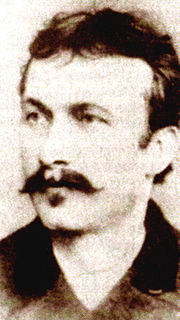 W
WFelix Aderca or F. Aderca, was a Romanian novelist, playwright, poet, journalist and critic, noted as a representative of rebellious modernism in the context of Romanian literature. As a member of the Sburătorul circle and close friend of its founder Eugen Lovinescu, Aderca promoted the ideas of literary innovation, cosmopolitanism and art for art's sake, reacting against the growth of traditionalist currents. His diverse works of fiction, noted as adaptations of Expressionist techniques over conventional narratives, range from psychological and biographical novels to pioneering fantasy and science fiction writings, and also include a sizable contribution to erotic literature.
 W
WMaria Banuș was a Romanian poet, essayist, prose writer and translator.
 W
WH. Bonciu, or Horia Bonciu, was a Romanian novelist, poet, journalist and translator, noted especially as an atypical figure on his country's avant-garde scene. His work, comprising several volumes of poetry and two novels, is a mixture of influences from the diverse literary schools of Europe's modernism, and, unusually in the context of Romanian literature, borrows heavily from German-born movements such as Expressionism. The autofictional and cruel detail in Bonciu's narratives makes him a senior figure among Romania's own Trăirist authors, while its capture of the unnaturally grotesque also finds him as one of the country's Neoromantics and Surrealists.
 W
WIon Călugăru was a Romanian novelist, short story writer, journalist and critic. As a figure on Romania's modernist scene throughout the early interwar period, he was noted for combining a picturesque perspective on the rural Jewish-Romanian community, to which he belonged, with traditionalist and avant-garde elements. His early works, including the novel Copilăria unui netrebnic, bring together elements of Social Realism, Surrealism and Expressionism over a conventional narrative line based on oral tradition and the classics of Romanian literature. Călugăru, who moved from the moderate Contimporanul magazine to the Surrealist platform unu, was also one of the main contributors to Integral, a tribune for avant-garde literature in general. Although publicly known for his socialist convictions and his far left inclinations, he was, through his position at Cuvântul newspaper, present in the proximity of fascist circles, and had an ambiguous attitude toward his employer, the far right thinker Nae Ionescu.
 W
WSergiu Dan was a Romanian novelist, journalist, Holocaust survivor and political prisoner of the communist regime. Dan, the friend and collaborator of Romulus Dianu, was noted during the interwar period as a contributor to Romania's avant-garde and modernist scene, collaborating with poet Ion Vinea on Contimporanul review and Facla newspaper. He was also affiliated with the rival literary club, Sburătorul, and noted for criticizing the communist sympathies of other avant-garde writers. His main works of the 1930s include contributions to the psychological novel, thriller and political novel genres, received with critical acclaim.
 W
WEmil Dorian was a Romanian poet and prose writer, as well as a physician.
 W
WD. Iacobescu or Dumitru Iacobescu was a Romanian Symbolist poet. His literary activity only lasted about two years, between his high school graduation and his death from tuberculosis, but made him a critically acclaimed presence inside Romania's Symbolist movement. Much of Iacobescu's work remained unpublished during his lifetime, and survived as autographed notebooks. Once rediscovered and published some twenty years after his death, it brought him posthumous recognition as a writer of talent, but one whose introversion and nostalgia ran contrary to the main currents in modernism.
 W
WBarbu Lăzăreanu was a Romanian literary historian, bibliographer, and left-wing activist. Of Romanian Jewish background, he became noted for both his social criticism and his lyrical pieces while still in high school, subsequently developing as a satirist and printing his own humorous magazine, Țivil-Cazon. Lăzăreanu's youthful sympathies veered toward the anarchist underground, prompting him to associate with Panait Mușoiu.
 W
WBarbu Nemțeanu was a Romanian poet, humorist and translator, active on the modernist wing of the Romanian Symbolist movement. Of Jewish Romanian background, he lived much of his life in the port city of Galați, which provided him with poetic inspiration, but whose provincial life sparked in him intellectual revolt. Orphaned and leaving school at an early age, then diagnosed with tuberculosis, he found meager employment as a clerk, but, throughout, maintained confidence in his poetic genius. Nemțeanu's Symbolism blended with socialism, but also with a lasting admiration for his adoptive Romanian culture, allowing him to publish pseudonymous work in traditionalist-antisemitic reviews such as Neamul Românesc. He was also one of the Symbolists who frequented the Convorbiri Critice circle, becoming personal friends with its leader, Mihail Dragomirescu.
Eugen D. Relgis (backward reading of Eisig D. Sigler; first name also Eugenio, Eugène or Eugene, last name also Siegler or Siegler Watchel; was a Romanian writer, pacifist philosopher and anarchist militant, known as a theorist of humanitarianism. His internationalist dogma, with distinct echoes from Judaism and Jewish ethics, was first shaped during World War I, when Relgis was a conscientious objector. Infused with anarcho-pacifism and socialism, it provided Relgis with an international profile, and earned him the support of pacifists such as Romain Rolland, Stefan Zweig and Albert Einstein. Another, more controversial, aspect of Relgis' philosophy was his support for eugenics, which centered on the compulsory sterilization of "degenerates". The latter proposal was voiced by several of Relgis' essays and sociological tracts.
 W
WRonetti Roman was an Imperial Austrian-born Romanian playwright and poet. Likely a native of Galicia, he settled permanently in Romania in the mid-1870s. Across the ensuing three decades, he made a name for himself as a polemical journalist, also writing poetry and satire, and concerning himself with the status of the country's Jews. His chief literary contribution was the 1900 play Manasse, which explores the intergenerational conflict between older, devout, tradition-bound Jews and their more secular, modern, assimilated descendants. While very successful with audiences, the play also drew fire from nationalist circles that took to the streets to block its staging on two separate occasions.
 W
WMihail Sebastian was a Romanian playwright, essayist, journalist and novelist.
 W
WAvram Steuerman-Rodion, born Adolf Steuerman or Steuermann and often referred to as just Rodion, was a Romanian poet, anthologist, physician and socialist journalist. A member of Romania's Jewish community, he was a lifelong militant for Jewish emancipation and assimilation, noted for poems which attack the prevailing antisemitism of his day. For a while, he was active as a propagandist of Hovevei Zion ideas among local Jews.
 W
WAlexandru Toma was a Romanian poet, journalist and translator, known for his communist views and his role in introducing Socialist Realism to Romanian literature. Having debuted as a Symbolist, Toma was influenced by 19th-century writer Mihai Eminescu, an admiration which came to characterize his entire work. The official poet during the early years of the Communist regime and appointed a full member of the Romanian Academy, he is considered by many commentators to have actually been a second-shelf writer, with a problematic legacy.
 W
WTristan Tzara was a Romanian and French avant-garde poet, essayist and performance artist. Also active as a journalist, playwright, literary and art critic, composer and film director, he was known best for being one of the founders and central figures of the anti-establishment Dada movement. Under the influence of Adrian Maniu, the adolescent Tzara became interested in Symbolism and co-founded the magazine Simbolul with Ion Vinea and painter Marcel Janco. During World War I, after briefly collaborating on Vinea's Chemarea, he joined Janco in Switzerland. There, Tzara's shows at the Cabaret Voltaire and Zunfthaus zur Waag, as well as his poetry and art manifestos, became a main feature of early Dadaism. His work represented Dada's nihilistic side, in contrast with the more moderate approach favored by Hugo Ball.
 W
WAbraham Leib Zissu was a Romanian writer, political essayist, industrialist, and spokesman of the Jewish Romanian community. Of lowly social origin and a recipient of Hasidic education, he became a noted cultural activist, polemicist, and newspaper founder, remembered primarily for his Mântuirea daily. By the end of World War I, he emerged as a theorist of Religious Zionism, preferring communitarianism and self-segregation to the assimilationist option, while also promoting literary modernism in his activity as novelist, dramatist, and cultural sponsor. He was the inspiration behind the Jewish Party, which competed with the mainstream Union of Romanian Jews for the Jewish vote. Zissu and Union leader Wilhelm Filderman had a lifelong disputation over religious and practical politics.